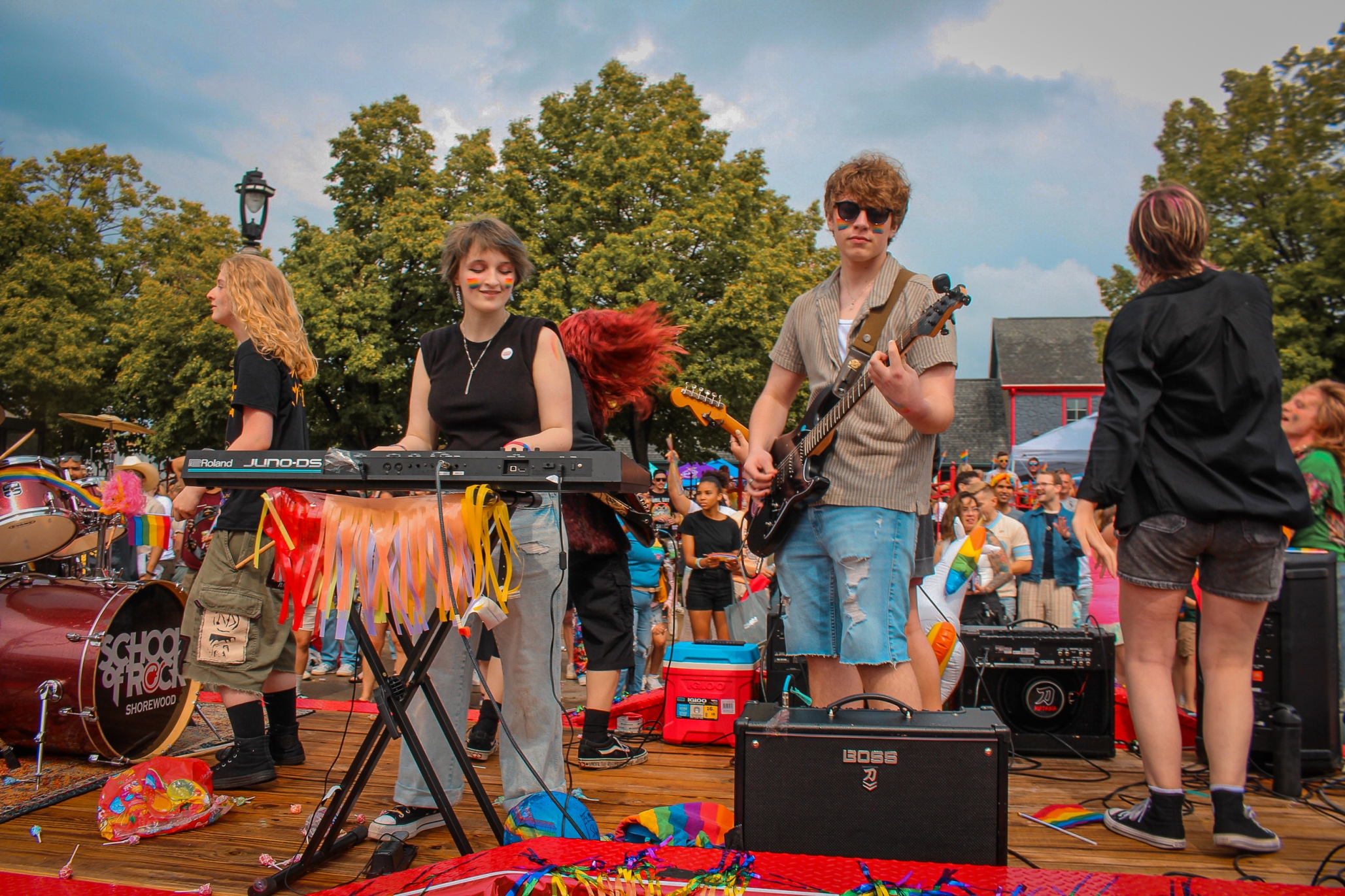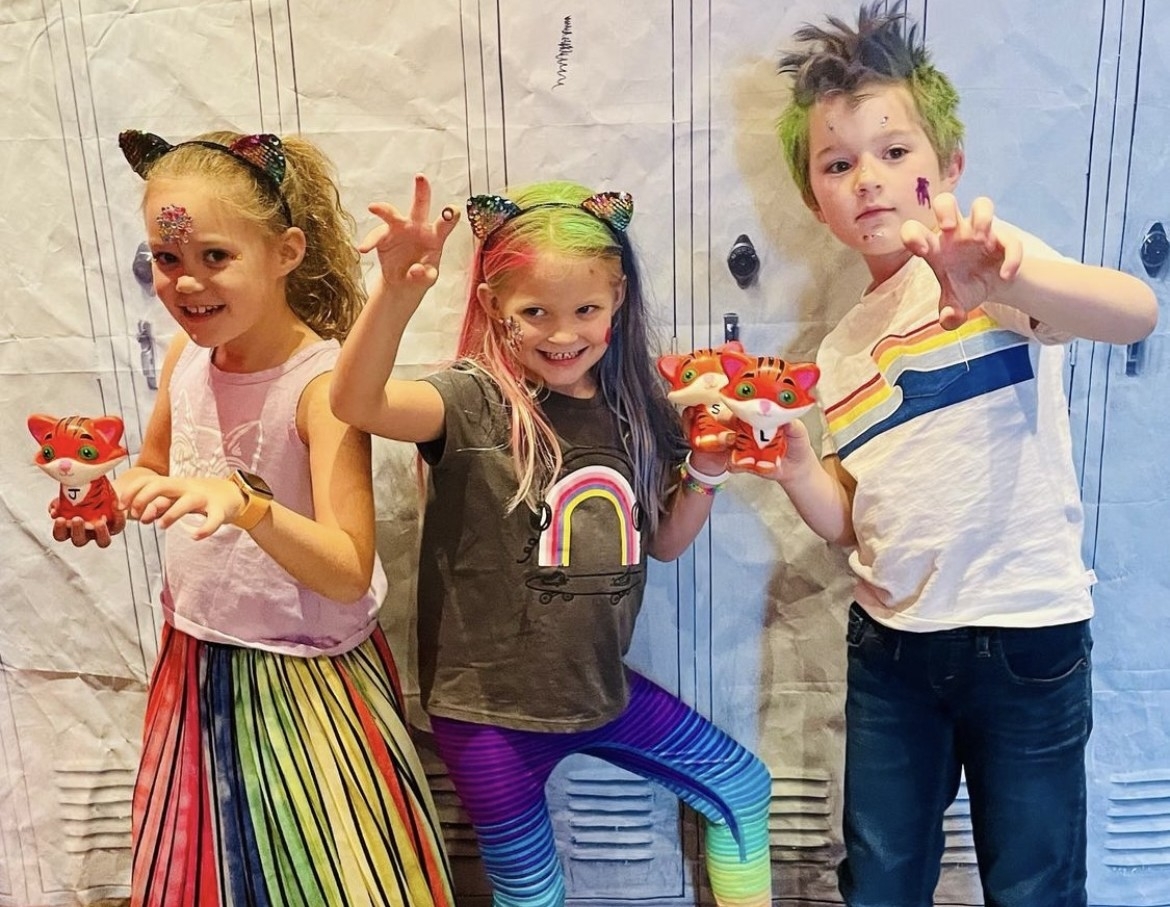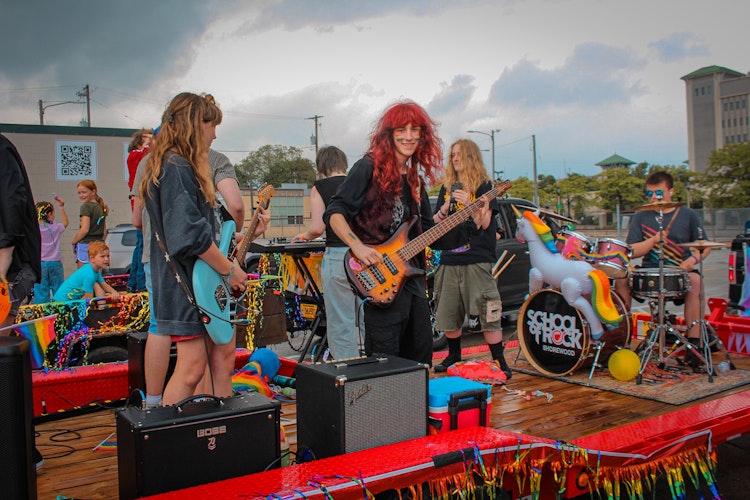For decades, people have been using the unique sound of rock music to explore questions of who we are, to wrestle with the intersections of identity, and to express ourselves. Over the course of the twentieth century, expressions of queerness were criminalized and marginalized, often making queer music one of the only safe places to voice these feelings. Queer themes in rock music can be found in songs by the LGBTQIA2S+ community and allies alike.
I Would Die 4 U - Prince
“I Would Die 4 U” is an upbeat, danceable pop song from Prince’s 1984 hit album Purple Rain. Forty years later, the song is still well-known and is considered one of Prince’s greatest hits.
On its face, “I Would Die 4 U” is a love song. The lyrics have spiritual undertones and can also be read as having queer themes. The first line of the song sums this up the best - “I’m not a woman. I’m not a man. I am something that you’ll never understand.” This kind of reference to gender expansiveness is typical for Prince, an artist who never conformed to the white, masculine standard of many rock and roll artists.
Prince’s legacy is one that can’t be measured, both in terms of his musical impact and his cultural impact, putting him among the ranks of the Nine Black musicians that changed the industry. Although Prince never publicly identified as a part of the LGBTQIA2S+ community, his gender-ambiguous lyrics and androgynous fashion choices have made him a queer icon.

Violence - Against Me!
“Violence” is a track from Against Me!’s 2005 album Searching for a Former Clarity. The song features a prominent rhythm section with a gritty bass line and a steady drum beat. You can learn what it takes to drive a song with all you need to know about rock and roll drums. Laura Jane Grace, the band’s lead vocalist, came out as a transgender woman in 2012. Many of the songs she has written for the band deal with queer themes, even those released before she came out.
The lyrics in “Violence” reference a secret from the beginning, and the line “pray they don’t find us” alludes to a relationship that has to be kept under wraps. The lyrics also make it clear that the consequences would be dire if the narrator’s secret were to be uncovered - “What could we have done to deserve the violence like this?” The song paints a dark picture of the unfortunate reality many queer people face, but there is hope in the song too - “It doesn’t have to be the way things end, we don’t have to give up just yet.” This speaks to the power of queer resilience despite the hardships we may face.
“Violence” is significant in that it gives an honest account of what LGBTQIA2S+ people have gone, and continue to go through. Even in countries that are considered more progressive and accepting of the queer community, violence is a real possibility and it disproportionately wielded against transgender women of color. Laura Jane Grace has consistently incorporated her experiences into her queer music, and she remains one of the most visible transgender women in the world of punk rock music.
Take Me to Church - Hozier
Hozier has cemented himself as an LGBTQIA2S+ icon over the course of his career, especially for queer youth. Hozier has consistently voiced his support for the community, and his queer music has explored similar themes since the release of his first EP, which includes the hit song “Take Me to Church.”
The lyrics of the song explore the tension between religion, or “the church”, in Hozier’s words, and sexuality. The music video for the song also features the story of a gay Russian couple who pursue a secret relationship because they live in an unsafe environment. The video highlights the reality of possible violence in everyday life that queer people face. Although queer rights continue to advance in many places, the message of this music video also reminds us that we must still work towards equality for everyone everywhere.
“Take Me to Church” is an anthem that reminds us that oppression is interconnected and universal. While this song may hit home the hardest for people who identify as members of the LGBTQIA2S+ community, the broader point is that violence can be wielded against any person who falls out of a very specific norm. The song (and moreover, the video) clearly condemns the act of using religion to discriminate, which is an important message for the entire world.
Rebel Rebel - David Bowie
No stranger to using music to explore his sexuality and push gender barriers, David Bowie was known for not abiding by the more strictly heteronormative views of the early 1970s. One of his most popular songs, 1974’s “Rebel Rebel”, features a driving backbeat and a glittering, repetitive guitar riff. The lyrics of the song reference the excitement of nightlife and draw heavily on queer themes. If you want to play it, our guide to guitar chords for beginners is a great place to start.
Bowie sings that the mother of the main character in the song isn’t sure if they are “a boy or a girl.” This line can be seen as affirming a nonbinary identity and as celebrating the increasing gender expansiveness of 1970’s fashion. As Bowie proclaims his love for the subject of “Rebel Rebel”, his own sexuality is obscured - the audience is left without ever knowing the “rebel”’s gender identity.
Along with referencing a potentially queer relationship, this song also posits the idea that, in a sense, queerness is for everyone and carries a strong association with the general freedom of being yourself. “Rebel Rebel” leans into the context of a world in which everyone is free to express themselves, regardless of how they identify. Gender ambiguity and experimental dress became staples of the 1970s, specifically among glam rockers like Bowie, who was a master of the stage. Learn how to emulate that energy with our guide on how to have the stage presence of a guitarist.
I Want to Break Free - Queen
Queen’s “I Want to Break Free” is a pop rock hit with an infectious melody that lends itself to Freddie Mercury’s powerful vocals. To develop your own range, start with these 9 best vocal warm-ups for singers. The song’s iconic music video features the members of the band dressed in drag. Drag is the practice of performing an exaggerated gender expression (often through dressing as a gender other than your own) and is both a longstanding British theatrical tradition as well as a staple in the queer community. The music video tells the story of housewives (played by the band) wanting to break free from monotony. However, the lyrics can also easily be read as a cry for freedom to express one’s identity.
A queer interpretation of this song sees the singer as wanting to “break free” from an oppressive homophobic society. “I Want to Break Free” was released in 1984 in the tumult of the AIDS epidemic, a time in which thousands of queer people were dying from the disease while homophobia heightened around them. The lyrics of the song describe the experience of falling in love, yet the singer has to “be sure when I walk out that door.” This could be a reference to having to hide a relationship due to fear of backlash.
The music video for “I Want to Break Free” caused considerable controversy in the United States due to the presence of drag. Because of drag’s association with the queer community, the video was not shown by MTV and the song did not receive as much air time as it did in other parts of the world. Despite this attitude in the States at the time, Queen has managed to infiltrate every aspect of American society to this day. From radio time on classic rock stations to sports arenas, the legacy of Queen is impossible to ignore. Although the original lineup is no longer intact, the band still tours and draws massive crowds. You can even learn to play like Brian May in our guitar lessons program.

Uptown - Prince
Released in 1980, “Uptown” is a funk rock track from Prince’s third album, Dirty Mind. Uptown is an idealistic place where “you can set your mind free” and be yourself regardless of who you are, which might be especially appealing to people with marginalized identities. The funky rhythm is driven by both guitar and a prominent bass line. If you're feeling inspired, check out our guide to buying your first bass guitar.
Within the lyrics, Prince references the fact that people often questioned his sexuality. The song lyrics tell the story of the narrator meeting a girl who asks “Are you gay?” to which he responds, “No, are you?” This exchange implies that both parties may not look “straight” based on the way they dress and their mannerisms.
The attitude of the song infers that gay or straight, freedom of expression is of the utmost importance - “Now where I come from, we don’t let society tell us how it’s supposed to be.” Prince celebrated this point of view in much of his queer music, which is one of the reasons it is so relevant to the queer experience.
All the Young Dudes - Mott the Hoople
This catchy glam rock tune was written by David Bowie for Mott the Hoople, a British band who released “All the Young Dudes” as a single in 1972. For those inspired by his craft, we offer a dedicated songwriting program. The song is both a celebration and a lamentation for the youth culture at the time, specifically for young men.
The verses in “All the Young Dudes” tell the stories of various characters, and one character named “Lucy” stands out as notably queer. The song’s “Lucy” is described as dressing “like a queen,” which is likely a reference to this person performing as a drag queen. A further line, “...but he can kick like a mule” implies that even though Lucy is into drag, they are still strong and a “man’s man.”
The song has been considered by many to be an early gay anthem. Though not many of the lyrics explicitly reference gay identity or queerness, the song is still about young men uplifting and celebrating other young men of the time.
Rock Music as a Medium to Explore Identity
Though the space often seems to be dominated by heterosexual men, rock musicians and their fans make up a diverse crowd of people who come from a plethora of different backgrounds and experiences. While queer themes can be found in many types of music, rock music is particularly free-spirited and conducive to exploration and experimentation. Whether you're listening to music or writing it yourself through our Adult Program, rock can be a very healthy way to explore identity and discover things about yourself. Start your own musical journey by exploring our full library of resources today.
About the Author
Kaylie King is the Music Director at School of Rock New Braunfels.





